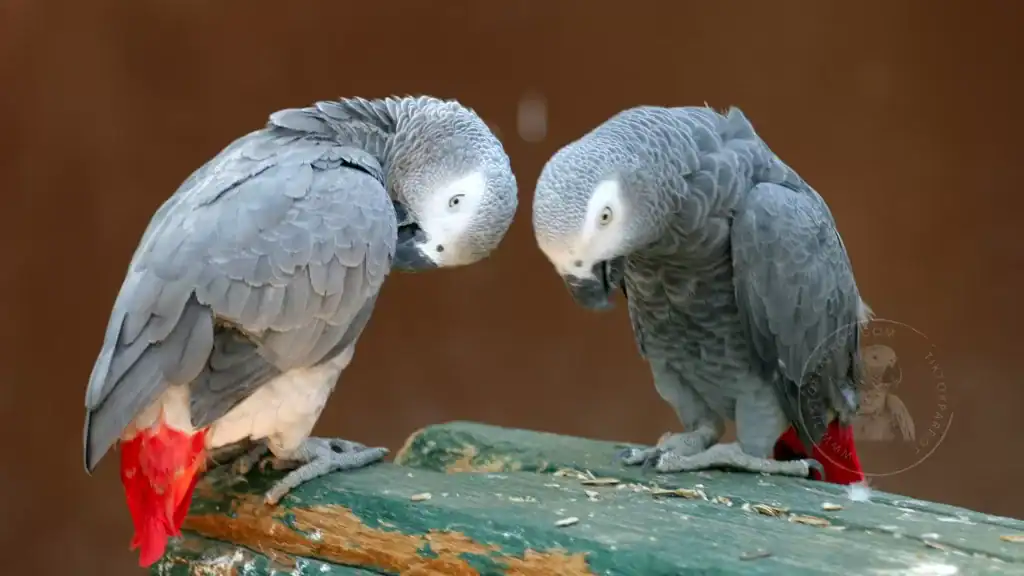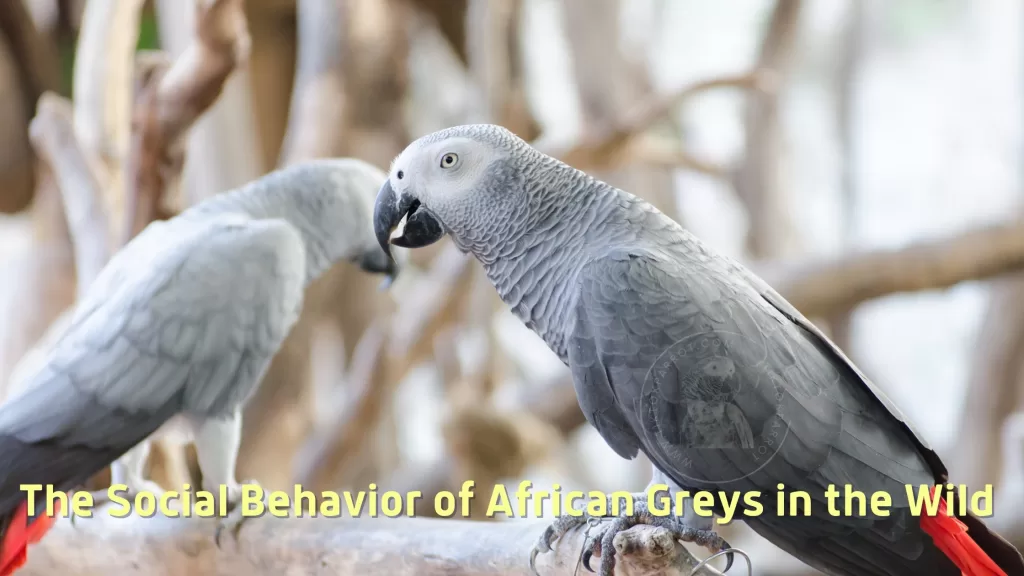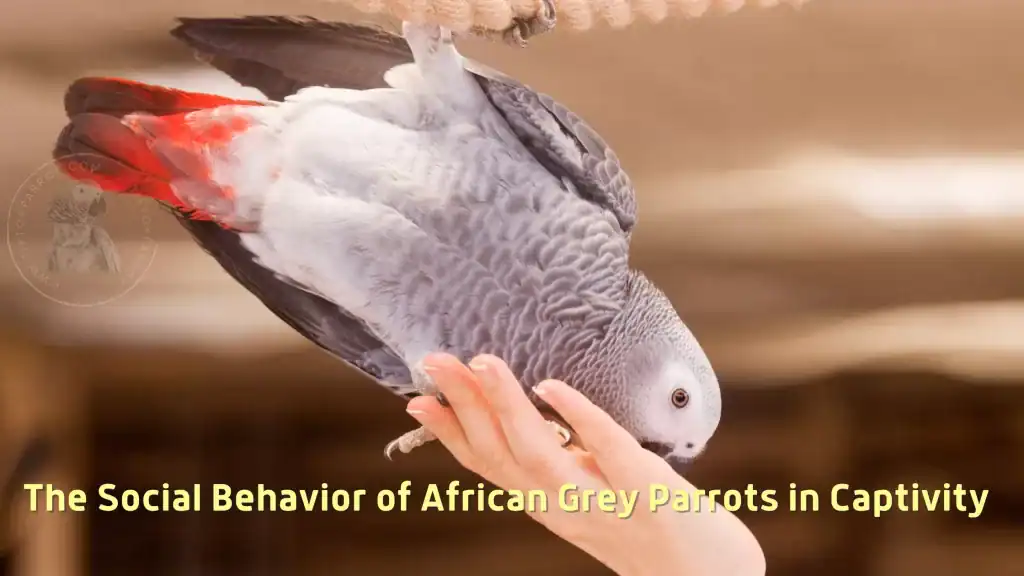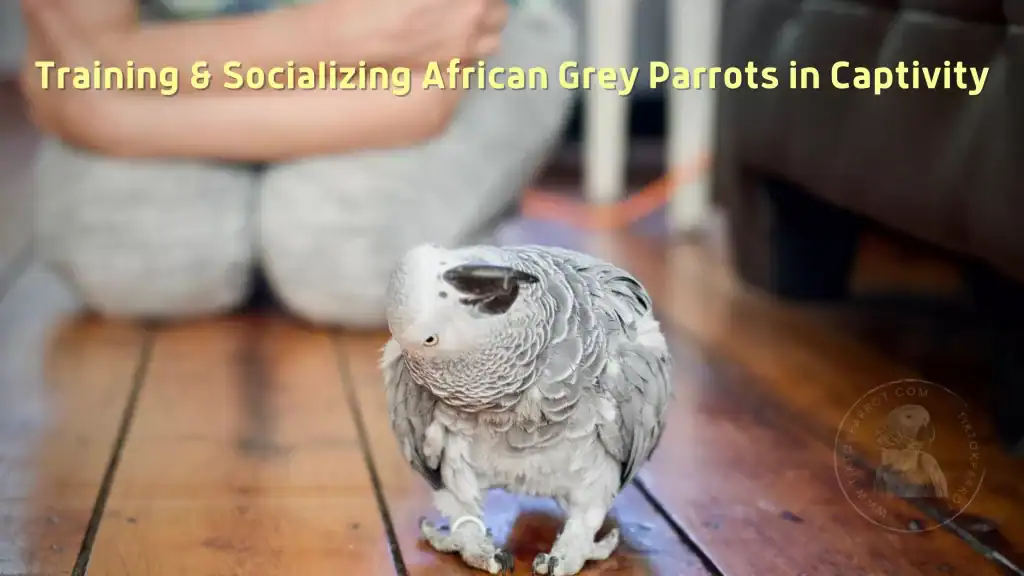African grey parrots are highly intelligent and social birds, known for their exceptional mimicry skills and ability to bond with humans. In the wild, they are found in the dense rainforests of West and Central Africa, where they form flocks of up to 20 individuals. In captivity, they are popular pets due to their affectionate personalities and impressive cognitive abilities.
Discover the fascinating world of African grey parrots and their social behavior in both the wild and in captivity. Learn about their communication, mating rituals, and social hierarchies in this in-depth article.
In this article, we will explore the social behavior of African grey parrots both in the wild and in captivity. From communication to mating rituals, we will delve into the fascinating world of these incredible birds.
The Social Behavior of African Greys in the Wild
The unparalleled social dynamics of African grey parrots in the wild showcase a fascinating blend of intelligence, communication, and cooperation, offering a captivating glimpse into their remarkable avian world.
Renowned for their remarkable cognitive abilities and vocal mimicry, these majestic birds exhibit intricate social behavior patterns, forming tight-knit communities, known as flocks, that engage in collaborative foraging, communal roosting, and cooperative breeding.
The impressive repertoire of vocalizations used by African Greys includes an array of distinct calls and complex songs, enabling them to maintain strong social bonds and effectively navigate their lush rainforest habitats.
These endearing parrots also demonstrate unique problem-solving skills, further highlighting their unparalleled cognitive prowess and shedding light on the captivating social intricacies of their wild lives.
Mating Rituals
In the wild, African grey parrots form monogamous pairs during the breeding season. The male will perform a courtship display, which includes bobbing his head and fluffing his feathers. The female will respond by crouching and spreading her wings. Once they have mated, the female will lay 2-4 eggs, which both parents will take turns incubating.
Flocking Behavior
African grey parrots are known for their flocking behavior in the wild. They form large flocks of up to 100 birds, which move together in search of food and water. These flocks are not just random groups of birds but are highly organized, with each bird playing a specific role.
Social Structure
African grey parrots have a complex social structure in the wild. Within the flock, there is a dominant pair that is responsible for leading the group. The other birds are arranged in a hierarchy, with some birds having a higher status than others.
Dominant birds will assert their authority over subordinate birds, often through aggressive behavior such as biting or chasing. However, they also engage in grooming behaviors, which help to maintain social bonds and reduce tension within the flock.
Communication
African grey parrots have a sophisticated communication system in the wild. They use a variety of vocalizations, including calls and whistles, to communicate with each other. They also use body language to convey messages, such as fluffing up their feathers to show aggression.
They have been observed using different calls for different situations, such as warning calls for potential danger and contact calls to stay in touch with other members of the flock. They are also known for their exceptional mimicry skills and can imitate the calls of other bird species as well as human speech.
The Social Behavior of African Greys in Captivity
In captivity, the social behavior of African greys reveals an astonishing level of adaptability, intelligence, and emotional sensitivity, making them sought-after companions for bird enthusiasts worldwide.
Often regarded as one of the most intelligent avian species, captive African Greys demonstrates a striking ability to learn and mimic human speech, enhancing their communication skills and strengthening their bond with their caregivers.
These highly social creatures crave emotional and mental stimulation, necessitating regular interaction, enrichment activities, and opportunities for socialization with both humans and other parrots.
Captive African Greys can also develop deep emotional connections, exhibiting loyalty and affection toward their trusted human companions. However, it is essential to provide a nurturing and engaging environment that addresses their complex social needs, as a lack of proper care may lead to the development of behavioral issues or emotional distress in these sentient and empathetic beings.
Bonding with Owners
African grey parrots are highly social animals and can form strong bonds with their owners. They crave attention and affection from their owners, and if they do not receive enough social interaction, they may become depressed or exhibit other behavioral problems.
They are known for their affectionate personalities and will often seek out human attention and affection. However, they require a lot of social interaction and stimulation to prevent boredom and the development of negative behaviors.
Mimicry
One of the most impressive abilities of African grey parrots is their mimicry skills. In captivity, they have been known to learn hundreds of words and phrases, as well as imitate sounds such as doorbells and telephone rings. They use this ability not only to communicate with humans but also to establish their dominance within their environment.
Behavioral Issues
Despite their affectionate personalities, African grey parrots can develop behavioral issues if they are not given proper socialization and stimulation. Common issues include feather-plucking, screaming, and aggression.
It is important for owners to provide their parrots with plenty of social interaction, mental stimulation, and environmental enrichment to prevent the development of these negative behaviors.
Social Interaction with Other Birds
African grey parrots can also form bonds with other birds in captivity. However, introducing a new bird to an established flock can be challenging, and owners should take care to introduce new birds slowly and carefully.
Play and Enrichment
African grey parrots are intelligent birds that require mental stimulation to thrive in captivity. Owners should provide their birds with a variety of toys and activities to keep them engaged and prevent boredom.
Training & Socializing African Greys in Captivity
Training and socializing grey parrots in captivity is a crucial aspect of ensuring their mental and emotional well-being while fostering a strong, fulfilling bond with their human caregivers.
By utilizing positive reinforcement techniques, such as clicker training and rewards, owners can effectively teach their parrots various tricks, commands, and even polite speech. Exposing these intelligent birds to new experiences and environments, along with regular interaction with humans and other parrots, helps to promote healthy social development and prevent boredom-induced behavioral issues.
Moreover, establishing a consistent routine that includes playtime, mental stimulation, and trust-building exercises can greatly enhance the overall quality of life for captive African Greys, resulting in content, well-adjusted companions who thrive in their human-centric world.
Training and socializing African grey parrots is essential to their well-being in captivity. These intelligent birds require mental stimulation and social interaction to thrive. The following are some tips for training and socializing your African grey parrot:
Positive Reinforcement
African grey parrots respond well to positive reinforcement, such as treats or praise. This can be used to train them to do tricks or to reinforce good behavior.
Socialization
Socializing your African grey parrot involves spending time with them every day and providing them with opportunities to interact with other birds and humans. This can include playtime, training sessions, and outings.
Environmental Enrichment
Providing your African grey parrot with a variety of toys, perches, and other environmental enrichments can help keep them mentally stimulated and prevent boredom.
Consistency
Consistency is important when training and socializing your African grey parrot. They thrive on routine and predictability, so it is important to establish a consistent schedule for feeding, training, and socialization.
Potential Behavioral Issues in African Grey Parrots
African grey parrots, while known for their remarkable intelligence and engaging personalities, may also exhibit potential behavioral issues if their complex physical, mental, and emotional needs are not adequately met.
Inadequate socialization, lack of mental stimulation, and an unsuitable environment can lead to undesirable behaviors such as excessive vocalizations, feather plucking, aggression, or self-mutilation. Addressing the root cause of these issues, be it loneliness, boredom, or anxiety, is crucial for the long-term well-being of these sentient creatures.
Providing a balanced diet, consistent training, proper socialization, and an enriched living space are key elements in preventing and resolving behavioral problems in grey parrots, ensuring their overall health and happiness as cherished companions.
African grey parrots can develop behavioral issues in captivity if their social and environmental needs are not met. Some potential behavioral issues include:
Feather Plucking
Feather plucking is a common behavioral issue in African grey parrots. It can be caused by stress, boredom, or illness. Owners should address any potential underlying causes and provide their birds with mental stimulation and environmental enrichment.
Screaming or Vocalization
African grey parrots are known for their loud vocalizations. However, excessive screaming or vocalization can be a sign of boredom or other behavioral issues. Owners should provide their birds with mental stimulation and social interaction to prevent excessive vocalization.
Aggression
African grey parrots can become aggressive if they feel threatened or if their social needs are not being met. Owners should take care to socialize their birds properly and provide them with a safe and comfortable environment.
Final Thoughts
African grey parrots are fascinating birds with complex social behaviors both in the wild and in captivity. When kept in captivity, they require social interaction, mental stimulation, and environmental enrichment to thrive.
From their vocal communication and intricate mating rituals to their social hierarchies and impressive mimicry skills, these birds are truly remarkable creatures. Owners should take care to understand their social behavior and provide for their needs to ensure their well-being. With proper care and attention, African grey parrots can make wonderful and rewarding pets.
After reading this article, now we know that Grey parrots are highly social birds that exhibit complex social behaviors in the wild. When kept in captivity, they require social interaction and mental stimulation to stay healthy and happy. As such, it is important for owners to understand their social behavior and provide for their social and environmental needs.
It is our responsibility to provide them with the proper socialization, stimulation, and care they need to thrive both physically and emotionally.
FAQs
- Do African grey parrots talk?
Yes, African grey parrots are known for their ability to mimic human speech and other sounds. - How often should I socialize my African grey parrot?
It is recommended to socialize your African grey parrot for at least an hour a day. - Can African grey parrots live with other birds?
Yes, African grey parrots can live with other birds, but it is important to introduce them slowly and carefully to prevent conflicts. - What is the lifespan of an African grey parrot in the wild?
They can die much earlier in the wild than they do in captivity, their lifespan can be as short as 8 to 30 years more or less in the wild. The main reasons for this are that humans hunt them for their feathers or they get captured to be sold as pets. - Can African grey parrots learn tricks?
Yes, African grey parrots are highly intelligent and can be trained to do a variety of tricks and behaviors using positive reinforcement techniques. - What do African grey parrots eat in the wild?
African grey parrots feed on a variety of foods in the wild, including fruits, seeds, nuts, and flowers. - How can I socialize my African grey parrot?
Socializing your African grey parrot involves spending time with them every day, talking to them, playing with them, and providing them with mental stimulation. - How long do African grey parrots live in captivity?
African grey parrots can live for up to 50 years or more in captivity if provided with proper care and nutrition. - Do African grey parrots form monogamous relationships in the wild?
Yes, African grey parrots are known to form monogamous relationships in the wild, with the dominant pair leading the flock. - What are some signs that my African grey parrot is bored?
Signs that your African grey parrot may be bored include feather plucking, excessive screaming or vocalization, and destructive behavior such as chewing on furniture or other objects. - Can African grey parrots form bonds with humans?
Yes, African grey parrots can form strong bonds with their owners and crave social interaction and affection. - How do I know if my African grey parrot is happy?
Signs that your African grey parrot is happy include vocalizing, playing, and showing interest in their surroundings. They may also display relaxed body language and a willingness to interact with humans. - Can African grey parrots be aggressive towards humans?
Yes, African grey parrots can become aggressive towards humans if they feel threatened or if their social and environmental needs are not being met. Owners should take care to socialize their birds properly and provide them with a safe and comfortable environment. - What kind of toys are best for African grey parrots?
African grey parrots enjoy toys that provide mental stimulation and encourage play, such as puzzles, foraging toys, and swings. - How much social interaction do African grey parrots need?
African grey parrots require at least an hour of social interaction with humans per day, but more is recommended to keep them mentally stimulated and prevent boredom. - Can African grey parrots learn to communicate with each other using human language?
While African grey parrots are capable of mimicking human speech, they primarily use their own vocalizations and body language to communicate with each other in the wild. - Do African grey parrots form long-term relationships with other birds?
Yes, African grey parrots are known to form long-term relationships with other birds in the wild and in captivity. They may even exhibit signs of grief if a mate or flock member dies. - How can I tell if my African grey parrot is stressed?
Signs that your African grey parrot may be stressed include excessive vocalization, feather plucking, loss of appetite, and lethargy. It is important to address any potential sources of stress and provide your bird with a safe and comfortable environment. - Are African grey parrots social animals or do they prefer to be alone?
African grey parrots are highly social animals and require social interaction to thrive. They may become depressed or exhibit other behavioral issues if they are kept alone for long periods of time. - Can African grey parrots recognize themselves in a mirror?
While African grey parrots are intelligent and self-aware, there is no definitive evidence that they are capable of recognizing themselves in a mirror. However, they may show interest in their reflection and engage in playful behaviors around mirrors.
If you found this blog helpful, It would be great if you could share it with your family and friends who might find it useful as well.
You might like to read these as well
The Mesmerizing Eyes of African Grey Parrot & What They Can Tell
Amazing Facts About African Grey Feet You Never Knew: A Deep Dive into Parrot Anatomy
Understanding of Grey Parrot’s Body Language
The Battle of the Birds: African Grey Parrot vs Macaw
African Grey Parrot Male or Female? (Determine Gender of African Grey)
Is Your African Grey a Jealous Bird? Here’s What You Need to Know!
The Surprising Benefits of Owning an African Grey Parrot
African Grey Parrots: The Ultimate Guide to Care and Training
Unlock the Secrets of Choosing the Perfect African Grey Parrot
The Importance of a Cage for Your African Grey Parrot
For more useful content about African grey parrots, you can subscribe my site with your email to get notification upon publishing a new blog, the subscribe box you can see on the right side of this page. Also if you get an alert on your web browser while browsing my site, allow it and that will also give you an alert whenever I publish a new blog.
Stay safe and much love !








